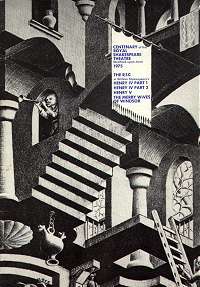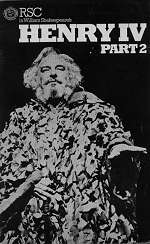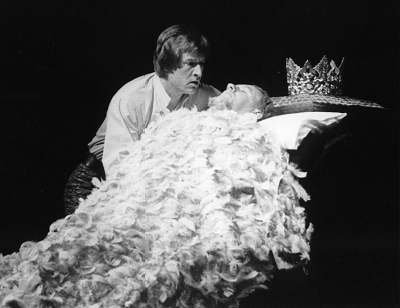


 |
 |
 |
|
As it used to be said of Godard's films, the Royal Shakespeare Company's Stratford season of Shakespeare's Lancastrian Trilogy has a beginning, a middle and an end - but not necessarily in that order. The RSC's centenary season opened with Terry Hands's acclaimed production of Henry V and continued with Henry IV Part 1. After all that hope and glory it could have been something of an anti-climax. Instead it turned out to be a consistently enjoyable, often dazzling, production which hardly struck a wrong note. The problem every director encounters with part 1 is how to give the other characters half the vigour and interest of Falstaff and Prince Hal in the tavern sequences. What Terry Hands has done is to give a very close reading to the scenes with Harry Hotspur and his wife Kate. Anne Hasson's Kate is barely more than a child, but in the physical passion of her emotions, excited, infuriated, rebellious and adoring, she becomes a force to be reckoned with, provoking Hotspur's grudging admiration. |
 |
Stuart Wilson's Hotspur is also very sharply drawn. Dressed in black leather and standing in a kind of permanent forward lunge, ready to explode into action, he has to be physically restrained by his wife and his brother. Every small detail goes to make his death at Shrewsbury much more dramatically effective than usual.
Nevertheless this is a play about the future king, and Alan Howard as Prince Hal gives him one of the richest interpretations I have seen. Wise before his time, he takes a sad pleasure in acting the fool. He clowns with a desperate gaiety, as if a moment's pause would bring thoughts too uncomfortable to bear, and when he merrily banishes Falstaff from his imaginary kingdom, the smile doesn't reach his eyes.
Brewster Mason's gigantic, bellicose Falstaff isn't the shabby figure some recent productions make him out to be. In public he is a match for Hal's insults. In private, he refuses to recognise the danger signals. Looming bulkily amid the smoke and percussion of battle, he delivers his homily about honour with a fine gusto; and he is ably supported by Tim W[ils]on's Bardolph, talking in a mottled bark from underneath the make-up for his villainously crimsoned nose. Only a disconcertingly mannered performance from Emrys James as Henry IV flaws this masterly production.
London Evening Standard, 28.4.75.
|
"LET THE END TRY THE MAN" - Hal's apophthegm to Poins - has been the watchword for Terry Hands's arrangement and orchestration of the three Hal plays. It will do too for a criterion of Hands's achievement; for achievement it is. By presenting us with the majestic urgency of Henry V and then placing it with, as it were, flashback to the Grand Mechanism of royal power and the social documentary of inns of court and carousal presented in the two parts of Henry IV, Hands has both rescued Henry V from a banal tradition and staged a rush of bold, illuminating theatre. Alan Howard, triumphantly coming of age as a classical actor, has given us a Hal against which Shakespeare's kings in performance will be set for comparison for many seasons to come. |
 |
Farrah's designs and Stuart Leviton's lighting have fashioned richness from economy. The company, moving easily from statuesque stylisation to ferocious power, have always placed most emphasis on clarity of text. It's been a mighty season - Merry Wives is yet to come - and the most eloquent argument yet advanced for shielding the RSC from debilitation by inflation.
What is so impressive about the Henry IV Part II production is the way Terry Hands has dovetailed the developing elements. The great domestic drama at court begins with Emrys James giving a dignified, mellow reading of the "uneasy" speech, hinting at his paranoia in his court of blond, blank, anonymous sons. As he approaches death, his manic, sweaty fear is lit harsh and head-on before a black curtain overhung with white, decaying branches. Though he still allows a lot of vibrato on the black notes, James is more controlled than he was in Part I, effective and affecting. When his desperation and Hal's haste come together, he works up to a terrifying cry of "Harry the Fifth is crowned" - the finest work I've seen him do - before relapsing into an Olivier-like breakdown. In a resonant stroke, it is Hal who carries the stricken father to the Jerusalem chamber.
Hal's progress matches this, working from the pensive, but physically loose, through the hardening at the summons in the tavern when a cloak conveys the assumption of authority, through the hazards of anticipated succession in which Howard keeps a tight rein on the emotion, merely toughening or softening the verse, out into the readiness for, exultation in and security of power and up to the climactic royal progress when Hal, utterly in gold, truly Falstaff's Jove, hesitates and then resolutely banishes his old mentor, and we have Henry V.
Falstaff suffers his autumnal decline with all the considerable aplomb Brewster Mason can muster. Mason makes of Falstaff's last show-stopper - the paean to "sherris" - the orotund pronouncement of a true connoisseur. Otherwise he rightly allows the Shallow scenes to play comic fulcrum until the sad and brave denial of his total humiliation at the end. Knowing the dog days have passed, he hobbles by the Lord Chief Justice, severe guardian of the new order, to stand alone under the twisted branches where a bird croaks.
Those branches are the play's emblem. In crafty-sick Northumberland's garden, they are bathed in rancid orange light. Whilst the Archbishop is politicking, a back-projected white cross seems to acquire, through the branches, a climbing, choking vine of thorns. Sydney Bromley, as an old branch himself, doesn't offer the tour de force Roy Dotrice (or indeed your correspondent in a school production) once made of Shallow but he's a spry and endearing bore and the relationship to Falstaff is right. Trevor Peacock's delayed action Silence is apt to upstage all comers. Griffith Jones's Lord Chief Justice precisely balances the judicious with the pompous.
In the closing stage pictures, Hands realises the value and price of kingship in Shakespeare's study. The motley, capering expectation of Falstaff's band vies for our attention with the dazzling, aloof certainty of the new court. Hal here relinquishes the companions of youth but not the experience. It is that which informs Henry V and which makes of this new-found trilogy a worthy exploration of self-knowledge as well as a grand piece of theatre.
W. Stephen Gilbert.
Plays and Players Magazine, September 1975.